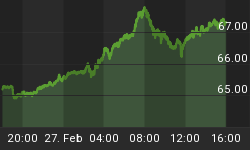The crisis is dead! Long live the crisis! In an attempt to address the debt crises swirling around the globe, policy makers have responded with a mishmash of somewhat questionable approaches:
Read past Merk Insights
- The U.S. has passed a financial reform bill not worthy of its name;
- The U.S. & Europe have engaged in stress tests that aren't all too stressful; and
- China, in an effort to contribute to a more balanced global economy, has allowed its currency, the yuan, to appreciate by a whopping 0.7% in recent weeks (year-to-date as of July 25, 2010).
In the meantime, the markets have been subsidized with fiscal and monetary stimuli:
- The Federal Reserve (Fed) has printed more than $1.5 trillion to jump start the economy;
- Congress is engineering trillion dollar deficits.
Policy makers say these subsidies are temporary and will be withdrawn as the economy recovers. In our assessment, that's the "exit strategy" option available for only one of at least three possible scenarios going forward
- The goldilock scenario of a gradual recovery takes place and policy makers follow-through with monetary tightening, as well as fiscal discipline. Given that nothing has worked out exactly the way policy makers have wished or planned for, we doubt this scenario will pan out as anticipated.
- The economy continues to run "below its long-run growth potential." There is no exit for a long time. i.e. lots of money will be spent and printed, but it won't have the desired effect policy makers are hoping for. It may be hazardous to investors' wealth to think this path won't be hazardous to the U.S. dollar.
- The markets may force an end to excessive monetary and fiscal stimuli. Should the Fed try to fight higher rates through quantitative easing, market forces may overwhelm the Fed (should markets lose confidence, there is only so much even a central bank can do).
Axel Merk's book, Sustainable Wealth: Achieve Financial Security in a Volatile World of Debt and Consumption is available now.
Europe is a prime example of a scenario in which market forces may prevail. We have seen what it means when the markets dictate the terms. The good news is that the sense of urgency has motivated European policy makers to engage in real reforms. By all means, the reforms are not perfect and may not be fully implemented, but major progress has been made in addressing structural deficits and fiscal coordination, key contention points of eurozone critics. Further, the European Central Bank (ECB) has not just talked the talk, but walked the walk: the ECB has embarked on an exit strategy; earlier this month €244 billion ($317.2 billion at $1.30 per euro) in liquidity was withdrawn (see our analysis).
Merk White Papers provide in-depth information into currency as an asset class.
Portfolio Benefits of The Currency Asset Class
The Currency Asset Class: A New Era of Investment Opportunity
The Archive:Merk White Papers
Note that real reforms may have a real impact. Key reforms in Canada got the country on the right track in the '90s. Switzerland, too, which was veering off the path of fiscal discipline in the '90s, came to its senses last decade (some of which is currently undermined; c.f. Switzerland Under Siege). Finland, these days quoted as the poster child with regard to fiscal discipline in the eurozone, underwent soaring unemployment and a banking system collapse in the early '90s; the Eastern Bloc, where Finland derived much of its trade from in those days, exacerbated the negative implications of a housing bust.
At this stage, the market is giving the U.S. the benefit of the doubt. But it won't be pretty if we wait until the markets dictate the terms. Of grave concern is that there appears little evidence of a concerted effort by policy makers to tackle the massive structural deficits facing the U.S. In our opinion, policy makers must not rest on their laurels, assuming the global market won't ever bring the U.S. to account. Eventually this may very well happen. Look at the housing bubble or the tech bubble - it's difficult to assess when these rides will be over; what is certain is that investors can try to take precautions now to take scenarios into account that veer off the goldilocks path.
We extensively discuss implications of these policies for consumers, businesses and investors; read the Merk Insights and subscribe to our newsletter. Please also join us for a webinar this Thursday July 29, 2010, where we provide an update on implications of the European stress tests, the economy and currencies; click here for information and to register. We manage the Merk Absolute Return Currency Fund, the Merk Asian Currency Fund, and the Merk Hard Currency Fund; transparent no-load currency mutual funds that do not typically employ leverage. This analysis is a preview of our annual letter to investors; to learn more about the Funds, please visit www.merkfunds.com.















